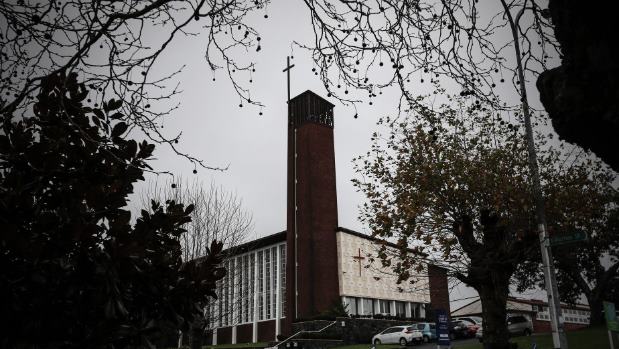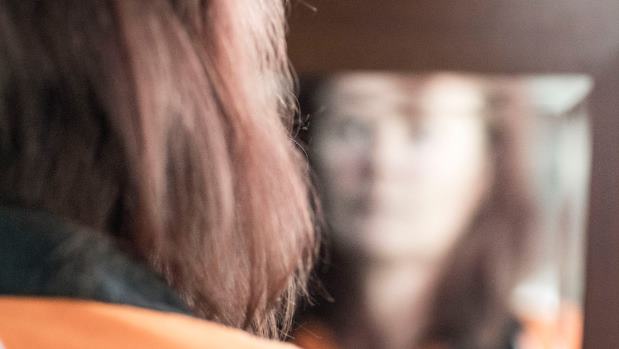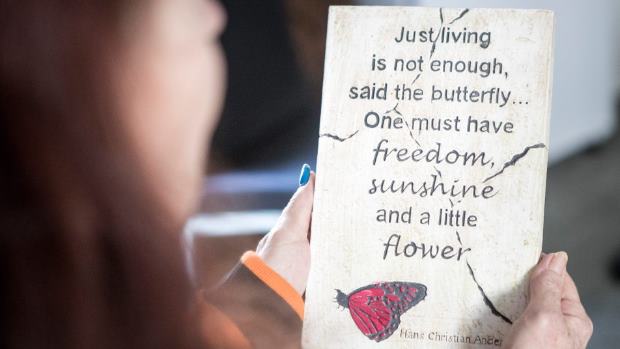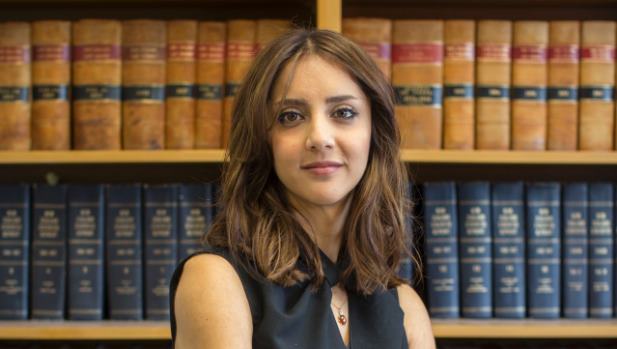|
Alleged abuse victims demand apology from Anglican Church Trust
By Helen King
Two people who claim they were abused in Anglican-run state care are demanding an apology for what they say are systemic failures. Rachel Smith* and Ernie Parore were placed in foster homes run by the Anglican Trust for Women and Children during the 1970s and 1980s. The Trust is part of the Anglican Church's social services network. Both say they suffered physical abuse that caused psychological scars they still wear today. The Anglican Trust says it needs to meet with the pair and check their claims before it can apologise to them – but Smith and Parore say the Trust has rebuffed their efforts to talk. It's not the first time the Trust has been at the centre of abuse allegations. In 2002, Ramon Doughty was convicted of 16 sex charges relating to offences between 1967 to 1974 when he and his wife ran Blackwood House, a trust foster home. PLACED IN CARE "Life has been tough, but I've learned to survive it." When Ernie Parore was five, he was separated from his six siblings, and they were scattered around Auckland. Some went to relatives and the others, including Parore, were placed in foster homes. "That was one of my hardest days because that was my love, my brothers and sisters. They were mum and dad, at that young age you connect with that so when I was taken away that was the deepest hurt." Social welfare stepped in after a neighbour complained about neglect they witnessed. "Our mother was a hard drinker. We had to fend for ourselves; we stole food and clothing." Over the next 10 years, he lived in 47 different foster homes and borstals around the North Island. Many children taken into the care of social welfare up until the 1990s were put into the care of church-based organisations that ran orphanages and children's homes. The Anglican Trust for Women and Children is the Auckland-based organisation where Parore, like Smith, was placed with to care for him when his mother couldn't. A LESSON IN BRUTALITY He describes foster care as his introduction to a life of violence. Beatings were dished out by staff or by other children in the boys' homes while social workers turned a blind eye, he says. At one home he remembers there was a shed in the back yard where the boys would go and sort out their differences. He would receive the first of many black eyes, bloody noses and beatings from the other boys. The worst of the violence happened in a room called "the Digger". "You'd get a hiding in there. You'd go to the Digger which was a confined room with nothing in it." He remembers a window too tall for a child to reach and a solid door too heavy to move. Staff would beat the children for minor infringements. "I thought that place was hell." He said the social workers would make sure the children weren't seen by visitors when they had black eyes or other bruises. Parore describes his life as being about survival, a constant struggle just to survive which left no room for dreams or aspirations. "Life didn't mean anything." A ROAD LEADING TO PRISON "I feel like all of those experiences were preparing me for this, preparing me for a life in prison." Parore is serving two concurrent sentences for violent crimes, one he committed as a 16-year-old, the second while he was in prison. He was sentenced to life in prison for murdering a man he called "uncle", although he wasn't a blood relative. He'd run away from a Corrective Training Centre in Wellington because he didn't like the military-style discipline. "I was quite clever about it. I took a staff uniform, and hot wired one of their cars and drove out quite normally." Once he reached Rotorua, he ditched the car and stole another. A Holden Belmont. He knew people would be looking for him at his mother's, so he went to Peter Fenwick, or Uncle Pete as he called him. The evening took a violent turn after the men both consumed home brew beer and cannabis, and an altercation occurred which left Fenwick dead. Parore believes it was ingrained into him to defend himself from any perceived harm, an instinct that also contributed to his second violent offence. In 1998, Parore was convicted of stabbing a prison officer at Auckland Prison in Paremoremo. Parore stabbed the officer after his cousin had received cancer treatment in prison and died a short time later. He blamed Corrections for his cousin's death and had taken out his anger on the officer. Parore isn't proud of the harm he's caused but understands how his background impacted on the decisions he's made. NORMAL LIFE STOLEN "I'd feel at home in prison," says Papakura resident Rachel Smith. She had a similar path to Parore, born to an alcoholic mother who gave her up as an infant; she grew up in foster homes and girls' homes run by the Anglican Trust. For Smith, the scars of abuse also run deep and continue to impact her in the present. Smith's allegations centre around two homes she was placed in, Brett Home on Auckland's North Shore and a foster family she stayed with in Papakura. "I'm always scared people aren't going to believe me when I tell them about the things that happened to me." Smith feels she was labelled as a difficult child and a liar which meant her claims of abuse were often brushed aside as a wild imagination. But her social welfare files show a life of physical and sexual abuse. At two years old a social welfare note labels her an institutional child, rocking, grizzling and unresponsive to cuddling. One of her foster parents is described as a lonely and chronically depressed woman who could not cope with Smith. In one note it states the foster parents "tell DSW they don't want Rachel" and that she "came from a bad family and was hopeless material to work on. Three and a half years of our best and results are depressing; we cannot go on." Included in the stack of social welfare files is a report describing a 10-year-old Rachel as having an "active sex life" with her brothers and father, which angers her now. "What 10-year-old has a sex life? That's not normal. It makes sense to me now why I had behavioural issues, but they didn't seem to do anything about it," she said. Another note states "physical punishment" was given at one home and others document further instances of sexual abuse at the hands of older boys in the neighbourhood. Some of the worst of the abuse were handed out by a foster mother who is described as an upstanding member of the community by social workers. But Smith remembers her differently. "I have bad asthma, and when I was a child, I would cough a lot at night. I would be sent outside in the freezing cold so I wouldn't disturb the other children." Smith doesn't remember having her own clothes until she was much older, often having to share with the other children. She described growing up in an environment of abuse and fear as shaping all her future relationships. "I feel like the ability to have a normal relationship has been robbed from me. I don't trust anyone; I'm always scared they'll betray me." Trust is also a concept Parore struggles with. "It's a fact that you can't comprehend, that people will do good things for you. The only way you can become like that is through your upbringing. Through that pain and anger, through that solitude, through all that stuff leads up to that place. Because people did this to you." WE WANT AN APOLOGY Parore and Smith have a simple request, recognition of the abuse they suffered at the hands of the organisation which was meant to take care of them when they were most vulnerable. "I don't care about financial compensation, all I want is for someone to say they're sorry for what happened," Parore said. Smith agrees. "To have someone acknowledge what went on would be huge for me." The manager of the Anglican Trust for Women and Children, Judy Matai'a, said the organisation would need to sit down with anyone alleging abuse in their care and find out what happened. "We would be interested to hear what they had to say." She confirmed they have had several individuals approach them through legal representation about allegations of abuse. "We've had some cases, but they were much earlier than the 1960s." Matai'a said they would only offer an apology if the victims agreed to sit down with them so they could check their claims against their records. Smith and Parore said they hadmade attempts to talk to the Trust, but say they have been rebuffed. VICTIMS HAVE THE RIGHT TO TRUTH Victims of state abuse advocate Netta Christian has heard many harrowing stories about historic abuse in children and foster homes. She said church organisations often didn't keep records which make it hard for people to get a clear picture of their past. "It's important as you get older to have a record of what happened to you so you can close the door on that chapter and get closure." Christian, who was abused while in state care, believes there could be hundreds of thousands of New Zealanders impacted by the issue and that it's time the Government held an inquiry. "We're the only Commonwealth country who hasn't had one, they've got a lot to hide." The Minister for Social Development, Anne Tolley, has repeatedly rejected suggestions for an inquiry stating The Confidential Listening and Assistance Service provided more help than an inquiry would. "Over seven years it helped people access their old records, funding counselling sessions and referring them to agencies for investigation." Tolley said claims for historic abuse were taking too long to settle which lead the Government to introduce a fast track system. "Following the introduction of the optional fast-track process, the number of settlements has more than tripled, to over 1,400, with total payments of over $22 million, all of course accompanied by an apology." Green party candidate and human rights lawyer Golriz Ghahraman said for victims of state abuse, the right to truth is often the key to justice. Ghahraman has worked in The Hague putting world leaders on trial for abuse of power. She believes it's time victims got to speak up and be heard. "It is the opportunity to tell their story and have that acknowledged by the powers that be." She said in international justice there is an understanding for people's right to the truth. "Most importantly it is the right to have the truth accepted on official record and start the healing process." *Rachel Smith's name has been changed to protect her identity.
|
.
Any original material on these pages is copyright © BishopAccountability.org 2004. Reproduce freely with attribution.



